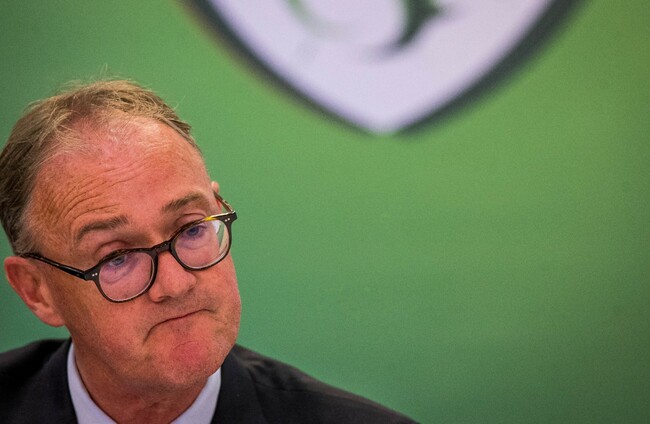SHELBOURNE CHAIRMAN ANDREW Doyle has written to FAI chairperson Roy Barrett to inform him of his resignation from the Association’s Finance Committee.
The story was first reported this afternoon by The Irish Sun.
In a strongly-worded letter, seen by The42, Doyle is very critical of the standards of governance at the FAI, branding the board’s performance on the matter as “appalling.”
Under the reforms recommended by a review of the FAI’s governance last year, the Association established a number of sub-committees, including a Finance Committee. Doyle was appointed to this Committee, but it has yet to meet.
“I’m not entirely sure it is possible to resign from a Committee which does not yet exist, but I do so in any event”, wrote Doyle. This isn’t the first such resignation to hit the FAI in recent months: PwC partner Seán Brodie resigned from the Audit Committee in May as it too had yet to meet.
The FAI hierarchy have explained that these Committees have yet to be fully populated and meet as they seek to implement a fit and proper person test for all potential members.
Doyle was elected to the FAI Council last year as a representative of Shelbourne, and is a graduate of Blackrock College and UCD. He has previously served as Partner at firms A&L Goodbody and then Matheson in London, before returning home to work as Managing Partner at Maples and Calder.
He voiced his concerns directly to the FAI board and interim CEO Gary Owens at a stormy Council meeting at the Red Cow Hotel last Friday, and informed Barrett of his resignation by email last Sunday evening. The email was also sent to Chief Operating Officer Rea Walshe, President Gery McAnaney, and Vice-President Paul Cooke.
Doyle wrote, “I am relatively new to the FAI Council, joining last year. I had hoped – indeed expected – that this years ‘new dawn’ would be bright and characterised by good governance at the very least.
“As I said to you at the recent Council meeting, and again in our conversation afterwards, this FAI Boards’ performance on governance – in a little over six months – has been appalling. As I said to you, the most galling thing is that it has been entirely avoidable. You could have done it differently. Yet, despite warnings, you did not.”
The FAI has been beset by division and rancour in the last week, ahead of a 31 August vote on the terms of the government bailout. Roy Barrett signed a Memo of Understanding with then-sports minister Shane Ross on 30 January that committed the FAI to a number of reforms, two of which proved contentious to those who must vote on them: a change to the FAI board to a split of six independent directors and six elected football directors; and a demand that Council members’ with more than 10-years’ service must stand aside this year.
In his letter, Doyle raised six specific issues.
He questioned Roy Barrett’s assertion that a 16 March vote by Council gave the FAI Board the authority to agree to the terms of a government along with a refinancing agreement with Bank of Ireland. Citing legal opinion disseminated among Council by member Nixon Morton, Doyle wrote that communication with Council relating to that 16 March “make it abundantly clear that Council was only being asked to approve the terms of the Bank of Ireland facility.”
He also criticised the FAI for holding a vote for permission to borrow €5 million from Fifa at last Friday’s Council meeting without offering the precise terms of the repayment.
“I support the borrowings, but governance, at its most basic, requires full information and transparency. Asking for a significant loan without informing the Council of the repayment terms is, well, ridiculous”, wrote Doyle.
Doyle was also critical of the failure to convene the Finance Committee from which he has now resigned.
“Yet you [Roy Barrett] have entirely failed, despite numerous formal complaints, to convene it. Your stated excuse, that you haven’t got round yet (due to pressure of work) to review the Terms of Reference is, as I said at the Council meeting, patently ridiculous.
“You have spent vastly more time in correspondence trying to excuse your failure to convene it than would have been required to review the Terms in the first place. In fact, the executive team seem more preoccupied with burnishing their reputations in media interviews and press releases (50 odd in six months) than on these key matters.”
Doyle also criticised the failure to provide the Finance Committee with financial information, which, he says, he and fellow member Larry Bass have been asking for since January.
“Nothing – absolutely nothing – has been provided. As I said at the meeting, I am as informed on financial matters as the passive observer who reads the media”, wrote Doyle.
The process by which Barrett signed the MoU on 30 January has been scrutinised in the last few days. Barrett received the MoU by email shortly before 9pm on 29 January, and sent it to his fellow board members at 9.02 am on 30 January.
No board meeting was held prior to Barrett signing the MoU, and a number of board members raised concerns about its terms via email. Barrett, however, believes he had a mandate to sign the document as the board made it clear at a 28 January meeting the priority was to strike a deal to save the FAI from insolvency.
This, wrote Doyle, was a “breach” of his duties as independent chairperson.
Doyle also found fault with the composition of the Nominations Committee, which identifies and recommends independent directors to be appointed to the FAI board. This Committee is understood to be chaired by Gerry McAnaney and consists of Dick Shakespeare and Barrett from the FAI board along with two reps appointed by Sport Ireland – Olive Loughnane and Peter McLoone – and an external recruitment expert Christina Kenny.
Doyle says this is a breach of the FAI rules, writing “rules require that independent non-directors are in the majority on this Committee.” The FAI rulebook doesn’t quite use this phrasing, but says the Committee can consist of no more than six people, and must include the FAI President as chair, one other board member, one expert in recruitment, and “up to three members co-oped by the board where necessary.”
Finally, Doyle writes that “the most egregious failure” is the fact he and Bass have raised these concerns over the last few months and, in Doyle’s eyes, “nothing has been done about them.”
“At one point you even told me – in writing – that you thought many of my points were reasonable. However you then went on to ignore them in correspondence and continue to obfuscate.
“You compounded this – extraordinarily – by saying at the Council meeting that if confronted with the same circumstances again as existed over the manner in which you signed the MOU – you would do exactly the same again.
“It is this obstinacy which has led me to the decision to resign as a member of the Finance Committee.”
The FAI declined to comment on Doyle’s resignation when contacted by The42.











The Roy Keane.
Someone who hasn’t grasped the idea that 5 aside football is normally just for a bit of craic with mates midweek and there are no medals handed out at the end but plays and shouts like it’s the champions league final and is still fuming and talking about it 3 days later.
The Gaelic Footballer.
Doesn’t get the idea of a one-two, thinks short passing is a waste of time and likes belting the ball as hard as he can up the other end of the pitch. Never lets you out of the corner; in fact runs full belt at you and tries to kill you. Loves to drop the shoulder, especially when challenging for the ball near the side wall. Short shorts, big arse, hugely enthusiastic, often whoops, but never gets asked back again.
Classic
Also will never pass the ball backwards.
The better brother of a guy who made it professionaly. The only reason this guy didn’t was because of the drink. ‘Could have played with Celtic’. Slaughters you for 10 minutes then has a coronary for 50 minutes.
The Pro….
Struts onto the turf with the newest gear out, under armour and hairband, first touch of a donkey but counts every goal scored week in week out (I’ve 30 goals in astro this season) and to top it off asks around after the game does anybody know of a good physio cuz he’s feeling a bit tight in the groin….
Eh, what’s up with the dates on people’s comments – they’re all over the shop!?
The sub…
Usually one of the lads sons who come along to get him outta the house so the mother can catch up on Corrie. He’s probably around 12-14 years old. He’ll go in goals so “no hard shots lads, sure he’s only a chap!’ Which is a distinct advantage. He’ll turn out to be amazing and no matter how hard you hit it, he’ll dive full length, collecting the ball in mid flight, a few somersaults and rolls and he’s off up the pitch, nutmegging and steps overs to bate tha band before sticking it in the top corner. As he walks back up the pitch, he’s given a little reminder of what age group of lads he’s actually playing with and someone decides to ‘soften his cough’ by ‘puttin a pup in him’ which ultimately results in a screaming kid rolling around all ‘ronaldo-esque’ with a shoving match between his dad and the offending individual. But all is settled with a few pints in the local with the young lad sippin a lemonade and chompin on a packet o’ Tatyo texting his mates with indecipherable gobbledegook about the dinosaurs he’s destroyed earlier….!
The john terry… He’s around shagging your missus while your not at home
The peter bonetti…..The keeper who is like a cat in 5 a side goals… But gets caught out on the big pitch!
The Heart – possesses all the drive, will and spirit a manager could ever ask of a player. Shows up every week and runs himself into the ground but ultimately has two left shins
Also known as the Zinedine Kilbane. Which would make it 2 right shins.
The Deer
Happy out chasing fellas and the ball. Gets caught in the headlights upon receiving said ball
The Hub
This is the guy who believes that the only good pass is a pass to him – generally loud and persistent.
The had trials ……
The muppet who was been chased by utd and Liverpool as a kid but wanted to do his leaving first! Turns out to be crap and then blames pitch,ball,lighting,his team,his footwear,drink from last night,injury……..
He wouldve made it if it wasnt for the drink…….
Forgot the dreaded “toy boy”. Shows up in the full Real Madrid kit with sparkling new green Astro boots wearing a head bank and gold cross around his neck. Cries off injured after 5 mins as everyone realises he’s awful.
For whatever reason somebody has pulled out due to “work”, always the same person, and the only replacement is another players son or nephew. The next 60 minutes involve getting nutmegged repeatedly and chasing his shadow.
The Rainman – really sweaty guy, with wet marks on chest, armpits, groin after 20secs of play. Spray of water in his wake and if you make any contact with, you may actually drown. Drinks out of everyone’s bottles and is a consistent back washer!! In a nutshell, wet!!
Nothing else happened except my goal… You’ve hammered him 17 3 but he’s scored a good goal… Maybe the best goal of the game but he’s otherwise been abysmal…. He ruffles your keepers head as you leave and tells him… Ha you won’t forget that one in a hurry…. You meet him in a boozer five nights later and he makes you lose the will to live jabbering on about it
“he takes a first touch that’s heavier than a black hole” – you my friend need to get a script writing role for Jim Beglin! http://www.youtube.com/watch?v=KKw3EO3xpQc (1.22, in the best video ever produced by RTE)
The sweaty guy. Starts pumpin after 5 mins. Or the football cogs guy. Catches ure ankle with a stud and just says ‘oh sorry, you alrite ?’ As he jogs on.
The Heather Mills. Can only pass/shoot with one foot which makes him as easy to read, can also be called the Roald Dahl.